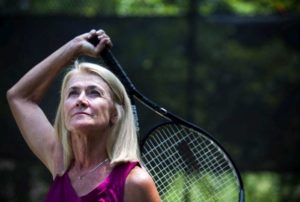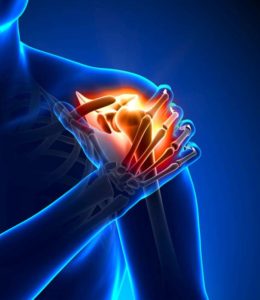
By: Marie Moore
Some of the perks associated with reaching a certain age can be better paychecks, a little extra time on the weekend and a greater appreciation for fresh air and good fun. Right? So, why is it that just as many of us are finding our golf ‘legs’, Mother Nature decides to mess with our swing?
For answers, I consulted with Dr. James W. Bean, an Orthopedic Surgeon who specializes in Arthroscopic Surgery and Joint Reconstruction. Dr. Bean and team at Sun City Orthopedic and Hand Surgery Specialists, prefer to utilize minimally invasive techniques and many of the procedures they perform address ‘Senior Swing.’
Dr. Bean explains, “A ‘swing’ in golf or tennis, is a coordinated effort of our skeletal, muscular and neurological systems. All of these systems are affected by age. We generally lose muscle mass and strength as well as develop some osteoporosis with aging. Also, our nervous system undergoes degradation, and loss of coordination is inherent with this process.”
 That sounded a quite ominous to me so I also asked what preventative steps can be taken to minimize these conditions. Dr. Bean went on to say that, “Regular exercise, including resistance exercises such as light weight training, are important.” He recommended that these should be combined with both cardiovascular exercises and stretching exercises as we age because, “All of these are important in helping to improve performance in any exercise activity.”
That sounded a quite ominous to me so I also asked what preventative steps can be taken to minimize these conditions. Dr. Bean went on to say that, “Regular exercise, including resistance exercises such as light weight training, are important.” He recommended that these should be combined with both cardiovascular exercises and stretching exercises as we age because, “All of these are important in helping to improve performance in any exercise activity.”
Besides the technical value of exercises, there’s no doubt that feeling fit also brings a sense of comfort and enjoyment to our golf and tennis games. It makes sense that our bodies will respond better to the vigorous demands of playing well when we’re stronger. Not to mention, how much more confident we’ll feel in our game. That confidence could be the deciding factor on the course.
However, a number of my friends have moved beyond the preventative stage and are now in the midst of correcting their swing through clinical procedures.
 “The number one shoulder condition we see in the elderly are changes in the rotator cuff which controls motion of the shoulder,” adds Dr. Bean. “There is atrophy and attenuation or thinning of the rotator cuff muscles in the shoulder with age.” This can definitely lead to the discomfort, weakness and lack of coordination experienced by those people I referred to in the last paragraph
“The number one shoulder condition we see in the elderly are changes in the rotator cuff which controls motion of the shoulder,” adds Dr. Bean. “There is atrophy and attenuation or thinning of the rotator cuff muscles in the shoulder with age.” This can definitely lead to the discomfort, weakness and lack of coordination experienced by those people I referred to in the last paragraph
And although injury can be prevented to some degree by practicing stretching and strengthening exercises, after a certain point, an aging rotator cuff and the subsequent pain it causes can prevent us from playing golf and tennis as well as participating in many of life’s favorite moments. If this is the case, don’t make matters worse by procrastinating. Book a medical consultation, speak with an expert and get your ‘Senior Swing’ back in the air.


